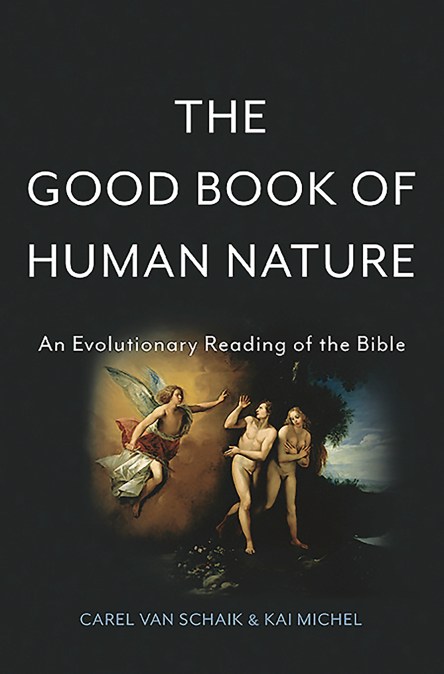Shopping Cart
The Good Book of Human Nature
An Evolutionary Reading of the Bible
Description
How reading the Bible as a work of cultural and scientific evolution can reveal new truths about how our species conquered the Earth
The Bible is the bestselling book of all time. It has been venerated — or excoriated — as God’s word, but so far no one has read the Bible for what it is: humanity’s diary, chronicling our ancestors’ valiant attempts to cope with the trials and tribulations of life on Earth.
In The Good Book of Human Nature, evolutionary anthropologist Carel van Schaik and historian Kai Michel advance a new view of Homo sapiens’ cultural evolution. The Bible, they argue, was written to make sense of the single greatest change in history: the transition from egalitarian hunter-gatherer to agricultural societies. Religion arose as a strategy to cope with the unprecedented levels of epidemic disease, violence, inequality, and injustice that confronted us when we abandoned the bush — and which still confront us today.
Armed with the latest findings from cognitive science, evolutionary biology, archeology, and religious history, van Schaik and Michel take us on a journey through the Book of Books, from the Garden of Eden all the way to Golgotha. The Book of Genesis, they reveal, marked the emergence of private property-one can no longer take the fruit off any tree, as one could before agriculture. The Torah as a whole is the product of a surprisingly logical, even scientific, approach to society’s problems. This groundbreaking perspective allows van Schaik and Michel to coax unexpected secrets from the familiar stories of Adam and Eve, Cain and Able, Abraham and Moses, Jesus of Nazareth and Mary. The Bible may have a dark side, but in van Schaik and Michel’s hands, it proves to be a hallmark of human indefatigability.
Provocative and deeply original, The Good Book of Human Nature offers a radically new understanding of the Bible. It shows that the Bible is more than just a pillar for religious belief: it is a pioneering attempt at scientific inquiry.
The Bible is the bestselling book of all time. It has been venerated — or excoriated — as God’s word, but so far no one has read the Bible for what it is: humanity’s diary, chronicling our ancestors’ valiant attempts to cope with the trials and tribulations of life on Earth.
In The Good Book of Human Nature, evolutionary anthropologist Carel van Schaik and historian Kai Michel advance a new view of Homo sapiens’ cultural evolution. The Bible, they argue, was written to make sense of the single greatest change in history: the transition from egalitarian hunter-gatherer to agricultural societies. Religion arose as a strategy to cope with the unprecedented levels of epidemic disease, violence, inequality, and injustice that confronted us when we abandoned the bush — and which still confront us today.
Armed with the latest findings from cognitive science, evolutionary biology, archeology, and religious history, van Schaik and Michel take us on a journey through the Book of Books, from the Garden of Eden all the way to Golgotha. The Book of Genesis, they reveal, marked the emergence of private property-one can no longer take the fruit off any tree, as one could before agriculture. The Torah as a whole is the product of a surprisingly logical, even scientific, approach to society’s problems. This groundbreaking perspective allows van Schaik and Michel to coax unexpected secrets from the familiar stories of Adam and Eve, Cain and Able, Abraham and Moses, Jesus of Nazareth and Mary. The Bible may have a dark side, but in van Schaik and Michel’s hands, it proves to be a hallmark of human indefatigability.
Provocative and deeply original, The Good Book of Human Nature offers a radically new understanding of the Bible. It shows that the Bible is more than just a pillar for religious belief: it is a pioneering attempt at scientific inquiry.
Newsletter Signup
By clicking ‘Sign Up,’ I acknowledge that I have read and agree to Hachette Book Group’s Privacy Policy and Terms of Use
Praise
"Scholars of religion and evolutionary biology, as well as students at the undergraduate and graduate levels, will find this book to be both informative and fascinating."
—Library Journal
"I never imagined that the familiar stories of the Garden of Eden, Noah's Ark, and the Sermon on the Mount would turn out to be unique anthropological documents. Carel van Schaik and Kai Michel are the authors best qualified to extract these insights."
—Jared Diamond, Pulitzer prize-winning author of Guns, Germs, and Steel
"It is simply astounding how much of the Bible makes sense when viewed in an evolutionary and anthropological light. This riveting, engaging and highly entertaining book is a must-read for anyone interested in the relationship between culture and biology."
—Daniel Lieberman, author of The Story of the Human Body: Evolution, Health, and Disease
